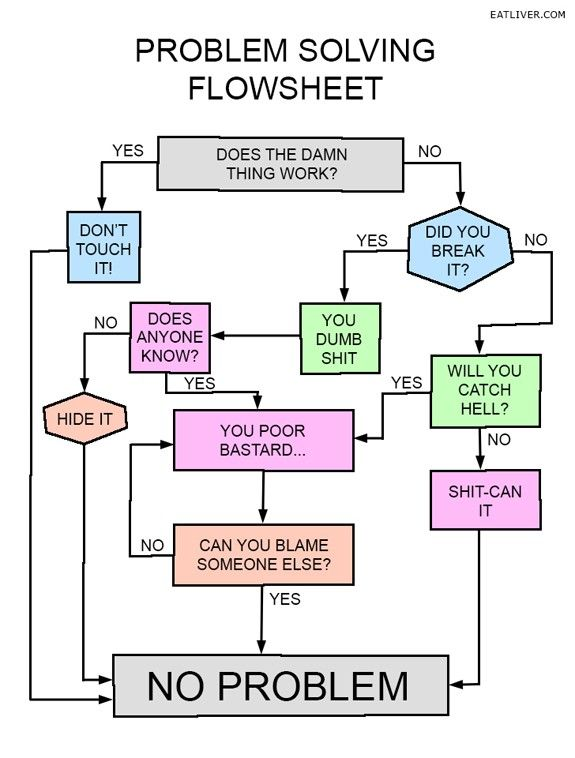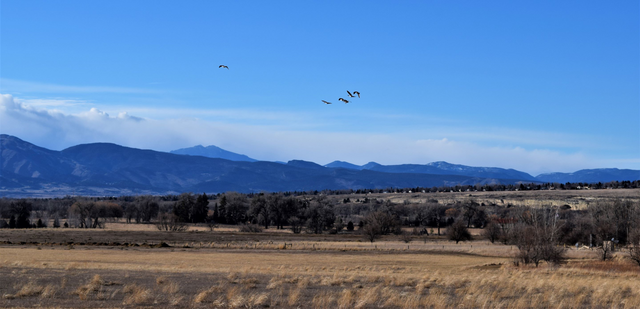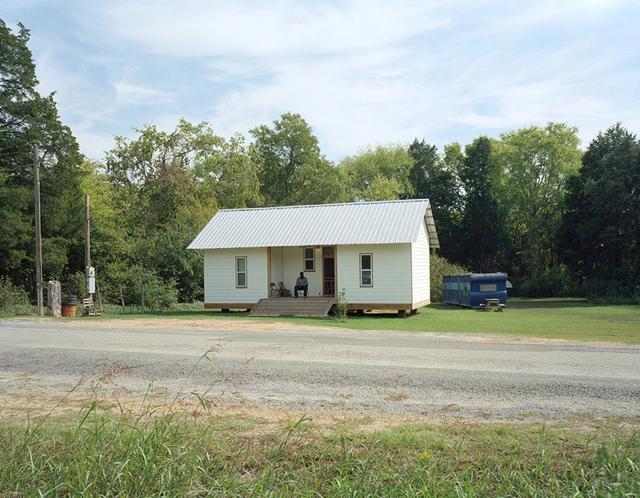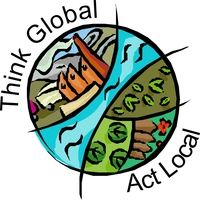Thoughts and Ideas on Community, Housing, Intuitive Design and How to become a Global Warrior
photo by torico
This post is (hopefully) the first in a series that I would like to unfold. Some of this unfolding may be awkward, so bear with me. I'm pulling together quite a few random thoughts into a cohesive whole.
Most people who know me on a casual basis might believe that I am somewhat silly piece of fluff known as the (rabid) puppy. I nom yummy cookies, post pretty pictures and spout nonsense. It's what I do. It's one of the many masks I wear to deal with how overwhelming the world can be. We all have different aspects and layers to our persona.
Yet at a different, I'd like to say deeper level, I ponder the human condition, the inter-connectedness we fail to consider or develop while living our busy egocentric lives. My mind contemplates pathways, searching for a solution to the increasing political polarization, injustices and psycho-social illnesses which plague our world.
I've been thinking about community for the last month or so, sifting through mental and emotional snapshots of conflicting ideological attitudes, philosophical discussions, virtual relationships, the multi-purpose tool that Steemit could be.
However if I am honest, I've been thinking about similar topics for my whole life.
My dad was an architect, my mom a visual artist and interior designer, so home design, construction and maintenance was always a constant in my formative years. My parents were constantly engaged with building, altering, redesigning and re-purposing. When they retired, they spent ten more years reworking the house they "retired" to. Crazy huh?
Despite that, I grew up without much knowledge nor practical skills in building or maintaining a home, a fact that I deeply regret, as my parents were always too busy for anything outside the house. We had some loose connections, but lacked a larger social structure or community. We epitomized the typical modern day unit of that time - the insular two parent closed nuclear family.
Look at that word, nuclear. What springs to mind? A closed cell, the act of splitting apart, a bomb. What a strange word to describe the relationship between family members. Along the path of my life I had to do a lot of reprogramming; redefining family, community, peace, friendship. Today my concept of family encompasses a much broader definition, as the internet has allowed all of humankind to learn and connect at so many levels.
In college, I was drawn to a variety of interconnected themes in quick succession. I started with psychology and sociology, jumped to urban planning and architecture, veered back to anthropology. Later I would go into media and communications, then international environmental politics, sustainable living, intentional communities, and non profit organizations. When my idealistic ideology bubble burst, I moved into alternative healing, science and the philosophy of values. I was on the 20 year college plan.
Yet there are several common threads running through all of these disciplines: philosophy, communication, health, sustainability, design/planning and purpose. In the last few years, my experiences on Steemit have gotten me thinking more and more about how to build an intentional community; one that has a common shared goal and philosophy, a direction in which I would like to see our world move towards.
courtesy of youtube
I'm gonna tangent here a bit.
Recently I watched a TED talks video on language and assimilation, the triggers which corresponds to how we perceive, relate and recall memories. According to this one gal (above), we are either lookers - the visualizers who think and remember in images; listeners - who are more in tune with words, sounds, and auditory signals; or touchers - people who tend to sense or relate through emotion and touch. It seemed odd to me that any person could perceive in just one way, unless of course they were blind or deaf.
What I noticed, however, is a fourth group she did not mention. The webworkers or conceptualists. People who are drawn to systems, relationships and interconnections, who remember at several levels, not only with each of their senses, but with their imagination. They might remember childhood through tv jingles or news events, explain something with a youtube video or cartoon. Perhaps they will relate an emotion with a meme, photo or song.
Conceptualists need to transcend normal communication. This group of people grew up with mixed media and technological advancement, and need to work with to a much wider international community using shared symbols and universal concepts. They want the big picture with surround sound, 3D Virtual Reality glasses and haptic tactile recliners.
Oddly this bit of self awareness ties in to a few career assessment tests which put me in the Architect/Strategist category. Apparently I would make an excellent war general, CEO, master planner or secret agent/spy.
I tend to go into new situations wanting to know the details of how everything is related and why things work how they do. Right away that can be an overwhelming task, especially in a new technology arena like cryptocurrency, which has so many variables and applications. What's more important is why. I want to be able to hack the system in order to streamline the inner workings; to make it work for me so I can have a simpler life. efficiency, innovation, simplicity, sustainability.
I would rather get from point A to step 5 using intuitive design and something called systems methodology. It's a bit mind boggling to suss but I've linked a primer.

generic problem solving chart of uncertain comedic origin credited to eatliver.com
I learned methodology in college. Basically it's a way to study a subject or investigate an idea by breaking it down into a logical flow chart. It's useful in building or problem solving, like reading a set of directions. Just imagine how much easier life would be if we had a set of directions for Earth! Instead we all make up or take on faith convenient assumptions about how things work, since the methodology for understanding climate change must be mind boggling. Or maybe we are just lazy.
Still, methodology is dead useful when trying to plan something when you need to explain it to a group of several other people who are rolling their eyes because you are taxing their last brain cell. Then again, some things are easier to get to using the side door. or spinning widdershins. Which basically means, "the map is not the territory". If you don't know that saying you should. Google it, nao.
The world is an inter-dependent sustainable system. Nature is the body of the world; breathing, perspiring, re-balancing.

photo by torico
Lets swing back to the basics. Lately I think and read a lot about alternative or intentional communities. Most of us grew up with the ideal of home ownership, the "American Dream". Shelter is one of the basic necessities, right behind food and water. Also there is a bit of me that is scared of the future, of growing old and dealing with economic uncertainty. And lastly there are thoughts about legacy - what am I going to leave behind on this earth for future generations.
I've researched alternative lifestyles; tiny houses, communes, earth ships, work collectives, eco-villages, co-housing - anything that would help people find an alternative sustainable lifestyle that provides for basic needs. I would love for everyone to better appreciate how we can live and work together towards this common goal, so that we can be free of government control, systemic impositions, to choose life instead of fighting over resources and destroying the earth.
We are all part of this world, so why do we insist on separating?
I could sit here and kvetch all day about social issues. What I would prefer to do is to focus on discussing common humanitarian issues and how to find reasonable solutions - problem solving outside of the box.
For instance, I read an article on how difficult it is for people with a low income job living in rural areas to obtain a mortgage for low cost sustainable housing. This had more to do with how home mortgages were structured in favor of big dollar amounts for people in higher income brackets. Banks were simply not in the business.
How did they (somewhat) resolve this? The Housing and Economic Recovery Act of 2008. A change in the law, enacted so that mortgage companies had to provide access to financing for affordable housing in rural areas.The government re-structured the mortgage system for people with low incomes to better serve the needs of the community instead of catering to the outmoded system instituted in a different generation, which was exacerbating the ongoing housing crisis.
Systemic Problems Behind Affordable Housing
linked article and photo from dwell magazine
I've often read, when looking at tiny homes and alternative housing options, that the cost is not a drawback in considering the purchase. Rather the real problems in deciding on tiny homes is one of location or law. There exist multiple issues; lack of available financing, zoning laws, state regulations on house size, and arbitrary housing codes for what is permissible in a house. Tiny homes and accessory dwelling units have solved design issues with plumbing, energy production and waste disposal in unique ways that while sustainable, still dont meet code solely because the code was written before the new technology was implemented. Amending laws takes time, and money.
Long story short, the market and the technology are there, yet state laws and institutions are slow or even belligerent in dealing with the need for change. One might even surmise that this is a form of latent ingrained classism pervasive in our system.
If the system does not meet the needs of the people, change the system. Quite a simple concept really, yet so few institutions are set up this way, with the flexibility needed to adapt to changing conditions. And what one hand giveth, the other taketh away.
Case in point, some people might say, oh this tiny homes thing is just a fad, a recent trend, a problem that our government is addressing. Maybe you should read the history of affordable housing going back twenty years, not just in the US but in Australia and Europe. Then try the most recent news.
2004: The Continuing Crisis in Affordable Housing
The Crisis in Affordable Housing Is a Problem for Cities Everywhere
What's driving the global housing crisis?
The American Housing Crisis Might Be Our Next Big Political Issue
President Trump Proposes Drastic Cuts to Affordable Housing Programs
No world will ever be perfect, yet I can't help but feel that our direction, as a culture, is less than promising, from politics and environment to outmoded paradigms. There are always the tiny advances, like a gadget that recycles and re-purposes plastic; the wonder of the internet; people who have acted or given selflessly to others, because it was the right thing to do. Because it needs to be done. But what can we do, really?
How can we build community through pro-active communication? How do we affect change in our communities?
Recently I had the pleasure of attending an impromptu mspw @r0nd0n pirate roundabout, appropriately titled, "Drunk Politics". After a short brainstorming, the group came out with a few basic ideas on how we can work towards political change and move towards a community prototype that might work at a local and national level.
Here is some of the take away of that discussion on how to effect change..
1) Educate the public. Educate yourself!.
Before we can educate people about any issues, we need to make sure they are able to read and think critically - what is a good news source? what is their slant or bias, who backs their work, who pays for the research, is that research verifiable, who are their experts. What are our own biases and how can we effectively suppress them when considering any facts? Who gets to be a trusted source and why?
If we look at this clearly, we may begin to see that data or ideas we thought were "facts" might actually be questionable or biased by preconceived notions, or even the interpretive opinions of others taken out of context. The research one might need to put into verifying "facts" is staggering, and what weight do we give each bit? Is my personal experience less of a fact than someone else? just because something is in the news, does it mean that its valid?
There are so many permutations and opinions of how facts should be evaluated that we might get into an argument on just what constitutes "truth". Wouldn't it be easier to concentrate on what we do agree on, and work on that? I feel that to agree to any change we must be willing to let go of our rigid stance and just act.
2) Get the money, ie; lobbyists, corporations, special interests, banks, bribes, super-pacs, out of politics.
To me this is pretty self explanatory. Our government is being controlled by the rich one percent who bicker among themselves for the assets and power to control the rest of us - to make the world how they want it to be. not for all citizens, but for their own greed. Why should we allow them access to our tax money to pay for convenient laws, red carpet healthcare, and golden parachute retirement packages? Why do we support this cycle?
3) Work Towards Change
Change doesn't come about without a price. Whether it's writing letters to your congressman, running for office, starting your own town, attending protests, petitioning, supporting an organization working for a cause - or restructuring your whole political and economic system with shit-coins and sweat, change comes through action. Set intentions to meet your lifestyle. If you think GMOs are ruining crops, you might want to start researching Bayer, who recently purchased Monsanto. Do you know what else they sell? (See the first step). Whats that phrase Crim likes? Personal responsibility!!
4) Decentralize Government
Put control into the hands of the many, instead of the few. Allow local communities a bigger say in how they will decide moral and ethical issues which constantly divide our nation, how the local community would like money to be allocated to serve the citizens, protect resources and rebuild infrastructure. Take the money that is wasted at the national level paying politicians who fight for power and put it to better use creating local industry, jobs and innovative solutions. It might seem pie in the sky, yet we all know that we dont get anywhere without trial and error. What we have now isn't working, imho. Time to move on.
I will reference the famous hippie saying..

Thanks for reading and I hope I wasnt too rah rah preachy or over-ranty. I got excited because I really believe that people need to come together in order to push in a better direction, even if its just 3 people and a goat walking off into the woods to start a mushroom farm. Hope to might more themed and or random tangential posts soon!
p.s. all unannotated thoughts or musings are mine, or are fictional brainfarts i've invented for the purpose of illustration.
Hello @torico, thank you for sharing this creative work! We just stopped by to say that you've been upvoted by the @creativecrypto magazine. The Creative Crypto is all about art on the blockchain and learning from creatives like you. Looking forward to crossing paths again soon. Steem on!
thank you :)
This was very well written, and gives a person a fair amount to think about when looking at the current systems, and how to start thinking about changes that we could make, even if only in our own lives.
i believe as time goes by it gets more and more difficult to stop myself from expounding on things that have not much to do with the topic, much like my mother does, which i roundly yell at her for. i wonder if we do turn into our mothers. i wish i could distill things better but lately my brain is a rabbit hole with several warrens and circular loops, a giant maze of fleeting images reflected in a teacup.
There are indeed many rabbit holes to jump down into...one subject leads to many different side paths to also explore and talk about.
This post was shared in the Curation Collective Discord community for curators, and upvoted and resteemed by the @c-squared community account after manual review.
@c-squared runs a community witness. Please consider using one of your witness votes on us here
To listen to the audio version of this article click on the play image.

Brought to you by @tts. If you find it useful please consider upvoting this reply.
Hi @torico!
Your post was upvoted by @steem-ua, new Steem dApp, using UserAuthority for algorithmic post curation!
Your UA account score is currently 4.777 which ranks you at #1460 across all Steem accounts.
Your rank has not changed in the last three days.
In our last Algorithmic Curation Round, consisting of 203 contributions, your post is ranked at #95.
Evaluation of your UA score:
Feel free to join our @steem-ua Discord server
Congratulations @torico! You have completed the following achievement on the Steem blockchain and have been rewarded with new badge(s) :
You can view your badges on your Steem Board and compare to others on the Steem Ranking
If you no longer want to receive notifications, reply to this comment with the word
STOPVote for @Steemitboard as a witness to get one more award and increased upvotes!